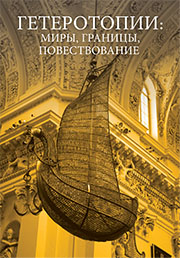Гетеротопии города-дачи-курорта в мире И. А. Бунина
Heterotopias of city-country-resort in Bunin’s world
Author(s): Eleonora ShestakovaSubject(s): Metaphysics, Russian Literature, Theory of Literature
Published by: Vilniaus Universiteto Leidykla
Summary/Abstract: This research is devoted to the problem of “another places” in the late oeuvre of V. Rasputin. The special models of heterotopias – cemetery, grave, island-ship (Matjora), delubrum, house as a bier – and the ways of realizing it are presented. Special attention is given to the observation of functions and human’s status within heterotopia. It’s proved that “another places” realize a hero’s nostalgia about meaningful existence, which has been already impossible in the history, and they are associated with prospects of self-discovery. The desire to expand the horizons of present into the limit of unspeakable opens the multilayered universe and rescues from the existential terror by being included in the metaphysical mystery of life. The models, used by author in the process of heterotopia’s comprehension, are received in original context in every work. The story “In the same land” (“V tu zhe zemlju…”) is about formation of a new cemetery far away from the native land, which is desecrated by power, so the funeral itself is transformed into an act of resistance. The protagonist of the story “Funeral feast” can’t overcome the desire to peek over the edge of life, he heads for the flooded cemetery and dies. A hero-trickster follows the same way. His path lies against the weed of river water to the sea, where the ancient course, “water of life” is preserved. A hut of the main character (the story “Izba”), which has been already incurable in the history, rises from within the soul, reality is conjured by the prophetic word and reports to it. A house is also a kind of coffin (domovina), becomes a crossroad of worlds, heterotopias, where alive and dead, righteous and sinful, insiders and outsiders get together. The research concludes, that “another places” in V. Rasputin’s oeuvre are not intended for life, they are places of self-discovery and choice, where the hero is given a moment of truth that he can disallow.The article attempts to answer one of the urgent literary questions on the basis of Bunin’s prose works. It is stipulated by the active usage of the notion “heterotopia” in social and humanitarian sciences, but a passive one in the philological field. The matter of the question has been stated in the following. Is it worth implementing one more notion when we have the developed, peculiar literary notions – artistic space, space and time correlation, topos, locus, discourse, chronotope – originated from the Ancient poetics? So we can claim that the given article is of the experimental nature. Attention has been paid to the Bunin’s prose analysis from the point of view of singling out and interconnecting principles and city-country-resort integrity. The research enables asserting the usage of heterotopia notion in the literary studies while explaining the complex, inherently labyrinthine connections and space-personality correlation, it cannot be seen and described within the terms of conventional notions and categories. Heterotopias of city-country-resort are mostly associated with the Bunin’s phenomenological perception of the personality, they reflect not only one another but also human inner essence as well as the deeds and situations which form the latter, change it, identify the unknown, and represent a breaking point of daily routine, known and familiar world, ego.
Journal: Literatūra
- Issue Year: 57/2015
- Issue No: 5
- Page Range: 295-305
- Page Count: 11
- Language: Russian

